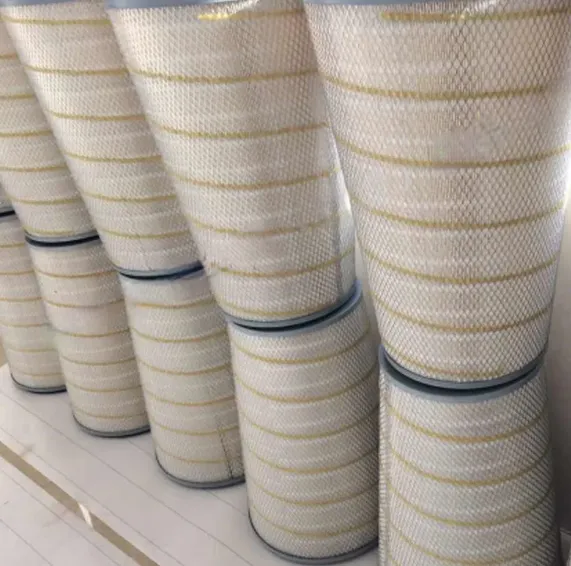 Tel:
+8615930870079
Tel:
+8615930870079
Mar . 14, 2025 09:46 Ad album
Ensuring Peak Performance with the Right Gas Turbine Filter: Maintenance, Material Selection, And Market Trends
In industrial settings where gas turbines are essential for power generation and other high-demand applications, maintaining the health of these turbines is crucial for optimal performance and longevity. Gas turbine filters play a vital role in protecting turbines from foreign bodies, contaminants, and airborne particulates that could reduce efficiency or cause mechanical failure. Understanding the maintenance practices, material selection, and current market demand for gas turbine air intake filter solutions helps businesses ensure their turbines operate at peak efficiency.

What to Do When Foreign Bodies or Contaminants Are Found in the Gas Turbine Filter
Foreign bodies and contaminants can pose significant risks to the performance and lifespan of a gas turbine. Gas turbine filters are designed to trap dust, debris, and pollutants, but if contaminants are found within the filter, immediate action must be taken to prevent damage to the turbine.
The first step is to conduct a thorough inspection of the gas turbine filter to assess the level of contamination and determine the type of foreign bodies present. If debris has collected in the filter, it may indicate an issue with the filtration process, such as clogging or a decrease in filter efficiency. It is important to remove the filter and clean it according to the manufacturer’s guidelines or replace it entirely if the damage is too extensive.
In some cases, contaminants such as fine dust or chemical particles may pass through the filter, leading to the potential for turbine malfunctions. Regular monitoring and cleaning schedules can reduce the occurrence of such issues. Operators should ensure that their gas turbine air intake filter is regularly replaced or cleaned based on operating conditions and the environment. Installing pre-filters or secondary filters is another proactive measure to reduce the risk of contamination entering the gas turbine.
The Impact of Material Selection on Gas Turbine Filter Failure Rate
The material selection for gas turbine filter construction has a significant impact on its performance and failure rate. Filters made from high-quality materials can extend the life of the turbine and improve the overall efficiency of the filtration process, while lower-quality materials may result in frequent filter failures and reduced turbine performance.
High-efficiency filters are typically made from synthetic fibers, metal mesh, or electrostatically charged materials that enhance their ability to capture smaller particles. Gas turbine air intake filter materials must also be durable enough to withstand extreme temperatures, pressure variations, and chemical exposure in harsh operating environments.
For example, filters made from advanced synthetic fibers, such as fiberglass or polyester, are more durable and can last longer under high-load conditions. In contrast, filters made from less robust materials may degrade more quickly, leading to a higher failure rate. The material choice also affects the air permeability of the filter, which is crucial for maintaining optimal turbine performance. Filters with better airflow characteristics reduce strain on the turbine, improving energy efficiency and preventing unnecessary wear and tear.
It is important for businesses to work with reputable gas turbine filter manufacturers who can recommend the best materials for specific operating conditions. The right material selection reduces downtime, lowers replacement costs, and ensures that the gas turbine air intake filter is providing the highest level of protection to the turbine.
Current Market Demand for Gas Turbine Filter Solutions
The global demand for gas turbine filter solutions has been steadily increasing, driven by the growing need for reliable, energy-efficient power generation. As industries continue to prioritize sustainability, companies are seeking ways to enhance the performance and reliability of their turbines, making high-quality filtration systems more critical than ever.
The rise of renewable energy sources and natural gas power plants has further fueled the demand for advanced gas turbine air intake filter solutions. These turbines are more frequently used in combined-cycle power plants, where the demand for efficient filtration systems is heightened due to the continuous operation of turbines. As gas turbines are utilized in a wide range of industries—from power generation to aerospace—the need for durable and efficient filters remains consistent.
Another factor driving demand is the increasing recognition of the importance of preventative maintenance. Many companies are now investing in advanced filtration systems as part of a broader effort to minimize unplanned downtime, reduce operational costs, and maximize the lifespan of their turbines. Additionally, the global focus on reducing emissions and improving operational efficiency aligns with the adoption of high-performance gas turbine filters that can ensure better turbine health and air quality control.
Why Choose the Right Gas Turbine Filter from Trusted Manufacturers
Selecting the right gas turbine filter is crucial to maximizing turbine efficiency and minimizing maintenance costs. Businesses need reliable filters that can withstand the demands of high-performance turbines. Partnering with experienced gas turbine filter manufacturers ensures that you receive filters specifically designed to meet the technical and environmental requirements of your operations.
The right gas turbine air intake filter can significantly reduce operational risks, prevent premature wear, and extend the overall lifespan of the turbine. With tailored solutions available, businesses can ensure that their turbines remain protected against contaminants, reduce the likelihood of downtime, and operate more efficiently in the long term.
Investing in a quality gas turbine filter is more than just a maintenance task—it’s a strategic decision that enhances the operational capacity and profitability of the business. As market demand for reliable and high-performance turbines grows, businesses must consider gas turbine filter solutions as an essential part of their operational infrastructure.
-
Types and Applications of Air Filtration CartridgesNewsJul.28,2025
-
The Role of Gas Turbine FiltersNewsJul.28,2025
-
Mastering Air Filter Cartridge UseNewsJul.28,2025
-
Advanced Turbine Filters for Modern Gas TurbinesNewsJul.28,2025
-
Cellulose Air Filter Cartridge Advantages in Dust FiltrationNewsJul.28,2025
-
Cellulose Filters for Air Particle ReductionNewsJul.28,2025

 Inscriptio:
Inscriptio:





